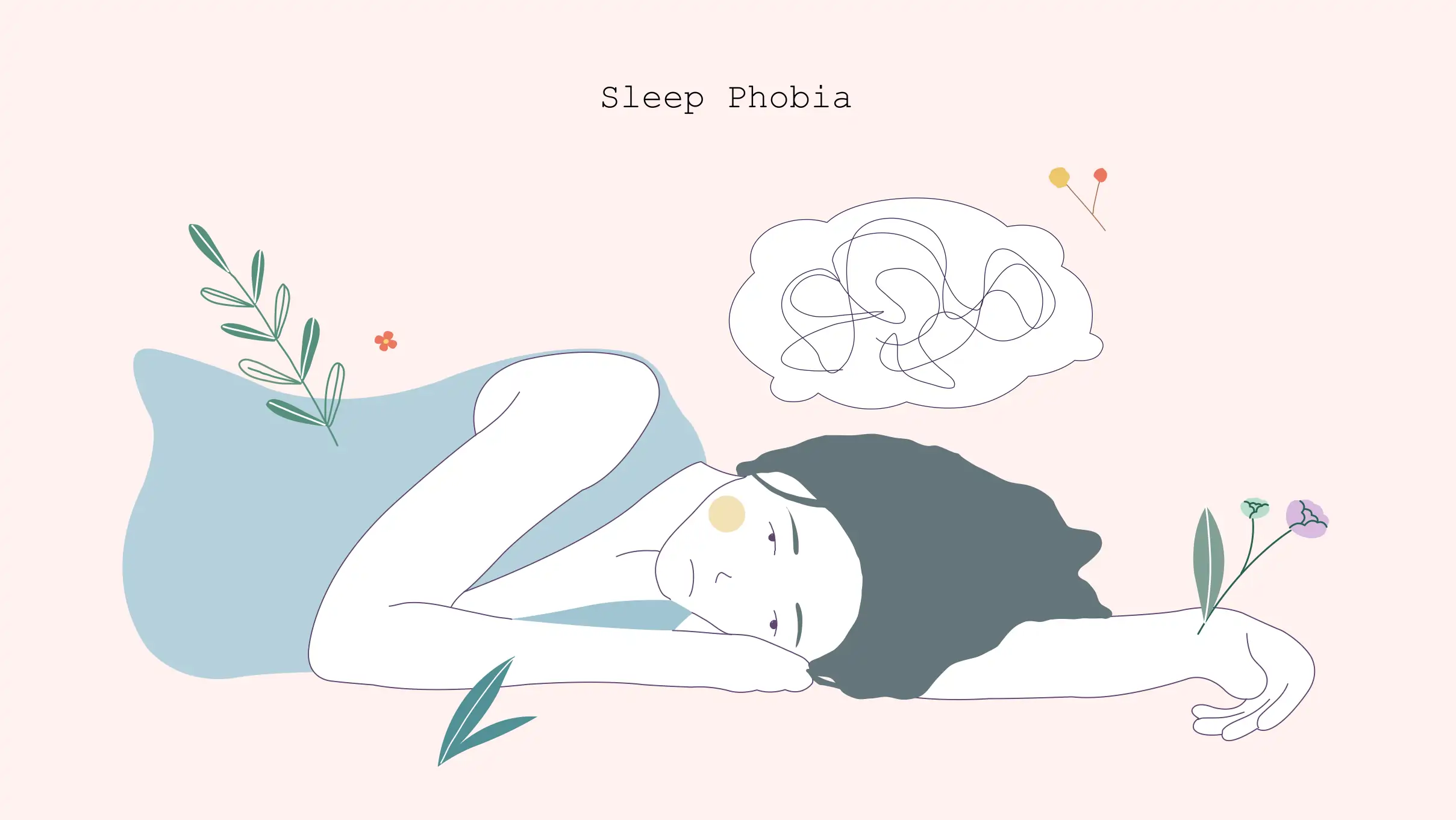What is Somniphobia: Causes, Symptoms & Treatment
Written by


Somniphobia, also known as night fear, is the irrational fear of falling asleep. This type of sleep phobia typically results in nightmares or insomnia and is often accompanied by feelings of helplessness and desperation. And through this article, we put forth its causes and symptoms and the best treatment options. Scroll down to find out:
What Is the Phobia of Sleep or Somniphobia?
Somniphobia (or sleep phobia) is an intense fear of sleep. This can be an overwhelming disorder that interferes with your daily life. A person might spend whole day worrying about sleep. You might avoid going to bed at night or wake up early because you fear falling asleep. Long-term lack of sleep includes depression, increased risk of heart attack, high blood pressure, obesity, stroke, and diabetes.
Somniphobia and Sleep Anxiety
Somniphobia and sleep anxiety are two types of fear of sleep. Sleep anxiety is being stressed about or the fear of going to sleep. Somniphobia is a specific type of sleep phobia in which one fears falling asleep. The sufferer experiences panic attacks and intense anxiety before falling asleep or waking up in the morning. While both sleep phobias can interfere with your ability to get restful sleep, they are not the same thing. Somniphobia is more intense and makes the person anxious that something terrible will happen if going to sleep.
Symptoms of Somniphobia
One of the main symptoms of Somniphobia is extreme anxiety and trying to avoid the situation-
- Avoiding bedtime
- Keeping the lights on while trying to sleep
- Bouts of irritation
- Difficulty concentrating the whole day
Such anxiety attacks or phobias can also cause certain physical implications. This sudden rush of anxiety or panic attacks can give some physical symptoms like-
- Cold Sweats
- Shortness of Breath
- Hyperventilation
- Nausea
- Tremors
- Heart Palpitations
- Chest Pain
Causes of Somniphobia
There are many different causes of somniphobia (sleep phobia), including:
- A traumatic experience with a parent or caregiver during childhood
- The onset of depression or other mental health disorders in adulthood
- Anxiety around falling asleep or going to sleep (hypnagogic hallucinations).
- Sleep Paralysis
How is Somniphobia Diagnosed?
The Diagnostic and Statistical Manual of Mental Disorders, in its Fifth Edition (DSM-5), has issued a handbook to diagnose phobias. And an individual with these signs may have a specific fear:
- Unreasonable, excessive, and persistent in the event of a situation or object
- Affecting day-to-day life and relationships
- Lasting for more than six months
- Experiencing significant anxiety
- Avoid the given situation
- Not better explained by any other mental health condition
How to Treat Somniphobia?
Exposure Therapy
Exposure therapy is a behavioural treatment for phobias and is used to help patients overcome their fears. The goal of exposure therapy is to gradually desensitise patients to the situations that trigger their fear response without having them experience the symptoms of their fear. In other words, they’re exposed to these situations in small doses until they learn how to function without experiencing anxiety.
Cognitive Behavioural Therapy (CBT)
Cognitive behavioural therapy (CBT) is a type of psychotherapy that helps people understand and change how they think about their fears and how to cope with them.
To treat somniphobia, you may recognise that worry about sleep is normal. CBT teaches you how to break down your worries into manageable pieces so that you can learn to accept them and move on. CBT also helps you learn strategies for managing your fears, such as relaxation techniques or guided imagery.
Eye Movement Desensitisation and Reprocessing (EMDR)
Eye Movement Desensitization and Reprocessing (EMDR) is a therapy that uses eye movements to help you process traumatic memories. The goal of EMDR therapy is to help you resolve the emotional distress that comes from experiencing a traumatic event.
The EMDR protocol was initially designed for use with individuals who had experienced early childhood sexual abuse or other forms of trauma in their lives. However, it can also treat somniphobia if the individual has experienced an accident or someone else’s negative behaviour toward them.
Medication
Several medications like beta blockers and benzodiazepines, can help alleviate the symptoms of somniphobia. But first, try the relaxation techniques and figure out what. Once you have determined what is causing your phobia, talk with your doctor about possible treatment options.
How Can I Reduce My Risk of Somniphobia?
You can reduce your risk of somniphobia by practicing good sleep hygiene. It refers to maintaining healthy sleeping habits, which include avoiding caffeine and alcohol before bed, keeping your bedroom comfortable, and avoiding disturbing noises such as ringing phones or loud music. You can also try using an alarm clock that wakes you up gently instead of an alarm that blares in the morning!
When to See a Doctor?
If you’re suffering from sleep phobia, you might feel like it’s the world’s end. Going to sleep is terrifying and causes you to lose sleep at night. You may even avoid doing anything that involves sleeping. If that is the case, you must consult the doctor immediately.
Conclusion
Fear of sleep is a severe problem and one that can be difficult to overcome. If you’ve developed this phobia, remember it’s treatable. Seek out your doctor; one day, fear of sleep may become a distant memory.
FAQs
How Do I Get Over My Fear of Sleeping?
Fear of sleeping is one of the most common fears that people experience in their life. It happens because you have been taught that your body needs to be awake and alert at all times, so when you go to sleep, you are afraid that your body will become paralyzed and unable to move. This is why you feel scared when you fall asleep.
How Do I Get Over My Fear of Sleeping?
Some techniques can help you get over your fear of sleeping:
- Exercise
- Meditation
- Journaling
- Deep Breathing Exercise
What Causes Fear While Sleeping?
It is said that fear while sleeping can be caused by nightmares or perhaps a bad or scary dream. The intensity of the fear is usually quite mild compared to real-life experiences. It can easily be controlled by simply waking up, walking around the room, and returning to sleep.
What Is Plakidiophobia?
Plakidiophobia is the fear of being touched. A person with plakidiophobia may also have phobias of other types, but they appear to be more comfortable with their fears than being touched by others. Many causes of this phobia include traumatic experiences in childhood and early adulthood, abuse, neglect, and feelings of abandonment by caregivers, peers, or family members.
What’s the Longest Phobia?
The longest-known phobia is agoraphobia which has been recorded for over one hundred years. It involves the fear of leaving home to go somewhere else where it might be possible to escape your fear!
people like this article
Written by








